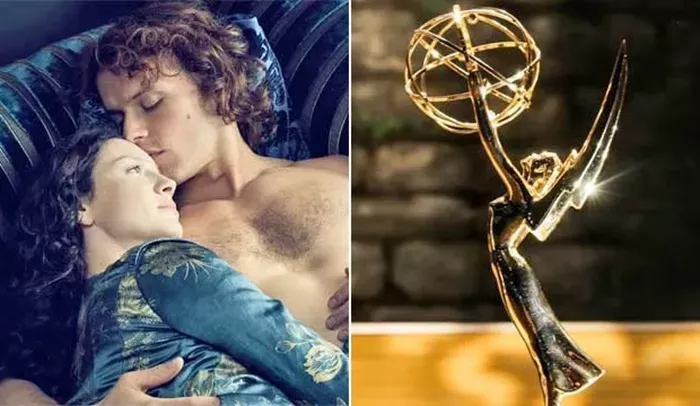Outlander is a historical drama series based on the best-selling novels by Diana Gabaldon. Since its debut in 2014, the show has gained a loyal fanbase and critical acclaim for its rich storytelling, stunning cinematography, and powerful performances. Starring Caitríona Balfe as Claire Fraser and Sam Heughan as Jamie Fraser, Outlander blends romance, war, science fiction, and fantasy into a gripping narrative that spans centuries.
Despite its popularity and artistic merit, Outlander has had a complicated relationship with the Emmy Awards. Many fans and critics believe the show has been consistently overlooked. This article explores Outlander’s journey with the Emmys, examining the nominations it received, the snubs it faced, and what this says about the television industry’s award culture.
Outlander and the Emmy Awards: A Brief Overview
Initial Expectations and Recognition
When Outlander premiered, expectations were high. The production quality was on par with cinematic releases, and the performances, especially from Balfe and Heughan, drew rave reviews. The show’s sweeping landscapes, intricate costume designs, and compelling character arcs made it a strong contender for awards season.
In its early seasons, Outlander garnered some technical nominations at the Primetime Emmy Awards. These included nods for costumes, production design, and music composition. However, major acting or series nominations remained elusive, sparking frustration among its devoted fanbase.
The Case of Caitríona Balfe and Sam Heughan
Caitríona Balfe’s portrayal of Claire Fraser has consistently earned critical acclaim. Her nuanced performance balances strength, vulnerability, intelligence, and emotion. Despite multiple Golden Globe nominations, she has not received a single Primetime Emmy nod for her role—something many see as a glaring oversight.
Sam Heughan’s portrayal of Jamie Fraser is equally compelling. His character’s emotional depth and physical demands should have placed him on the Emmy radar. Yet, he too has been snubbed, further fueling the perception that the Academy may overlook genre shows, particularly those that blend romance and fantasy.
Exploring the Emmy Snubs
Critical Acclaim vs. Awards Recognition
One of the biggest puzzles surrounding Outlander is its disconnect between critical praise and awards recognition. While the show frequently appears on “best of” lists, it rarely makes it onto the Emmy Awards Nominees list in major categories. This discrepancy raises questions about the Emmy voting process and potential biases.
Genre shows—particularly those outside traditional drama formats—often struggle for mainstream awards recognition. Outlander’s blend of historical fiction and fantasy may contribute to its omission, despite consistent quality.
Fan Campaigns and Social Media Pressure
Outlander fans have not remained silent about the perceived Emmy snubs. Numerous online campaigns have urged Emmy voters to reconsider the show’s merit. Hashtags like #EmmysForOutlander and petitions calling for recognition gained traction over the years.
While social media advocacy sometimes influences awards discourse, in Outlander’s case, it has not yet led to significant results. Nonetheless, the passionate fanbase continues to champion the show’s contributions to television.
Where Outlander Has Found Recognition
Other Awards and Honors
Though the Emmys have largely overlooked Outlander, other institutions have not. The show has received nominations and wins from the Critics’ Choice Awards, Saturn Awards, and the BAFTA Scotland Awards. These accolades highlight its cross-genre appeal and international recognition.
The Saturn Awards, which honor science fiction, fantasy, and horror, have consistently recognized Outlander. Caitríona Balfe has won Best Actress multiple times, showcasing the industry’s appreciation outside the Emmy mainstream.
International Recognition
Outlander’s international appeal has been strong, particularly in Europe and Canada. Its attention to historical accuracy and strong character development resonates globally. The show even found mention in the International Emmy Awards discussions, reflecting its broad reach.
International recognition, while not as publicized in the U.S., is a testament to the show’s quality and enduring popularity across cultures and languages.
Comparing Outlander with Other Emmy Contenders
Genre Bias at the Emmys
Historically, Emmy voters have shown a preference for prestige dramas set in realistic settings. Shows like “The Crown,” “Succession,” and “Breaking Bad” often dominate nominations. Fantasy or science fiction series struggle unless they achieve extraordinary mainstream popularity, as seen with “Game of Thrones.”
Outlander’s genre hybridity—mixing historical drama with time travel and romance—may place it in a less favored category. Despite its complex themes and high production value, it has not been embraced the way more traditional dramas have.
Acting Recognition: A Missing Piece
The absence of acting nominations for Outlander is especially notable when compared to similar shows. While Balfe and Heughan carry much of the narrative weight, they have not received the accolades their performances arguably deserve.
This inconsistency suggests that Emmy voters may prioritize certain types of performances over others, favoring realism over theatrical or genre-specific storytelling.
Conclusion
While Outlander’s Emmy history is marked more by absence than celebration, that doesn’t diminish its importance in television history. Awards are only one metric of success, and Outlander has succeeded in captivating audiences and pushing creative boundaries.
The show’s cultural impact, fan devotion, and artistic quality speak louder than a golden statue. Whether or not it ever wins a major Emmy, Outlander remains a standout in modern television.

